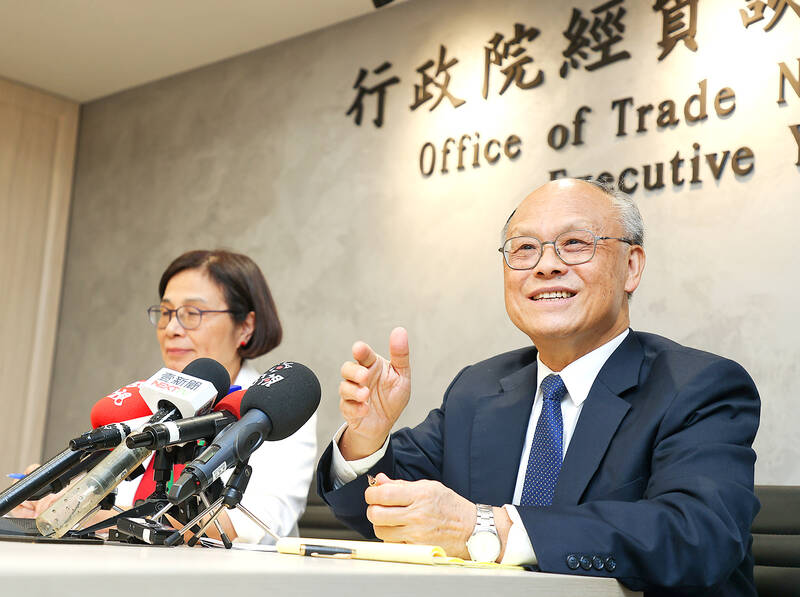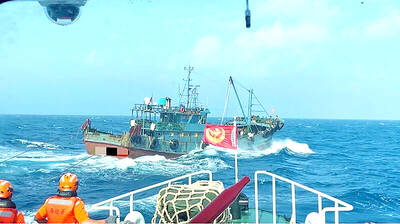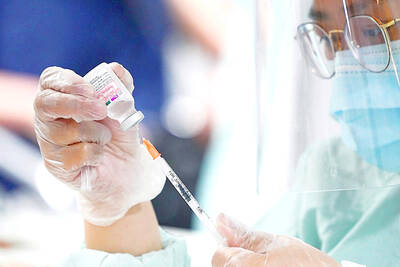Taiwanese and US representatives yesterday wrapped up the latest round of in-person trade talks in Taipei, but did not succeed in inking any agreements, Minister Without Portfolio and top negotiator John Deng (鄧振中) told a media briefing.
“The two sides gained better understanding of bilateral rules and differences on issues regarding labor rights protection, trading of agricultural products and environment protection,” Deng said.
The two sides needed more time to clarify details before working out a pact in line with the second phase of the US-Taiwan Initiative on 21st-Century Trade, Deng said.

Photo: CNA
Taiwan is seeking access to the US market for its mangoes and pineapples, as well as pork floss and sausage, Deng said.
There is a great need of new export destinations for these two fruits due to pressure from China, he said.
“Exports of agricultural products require complicated and longstanding negotiations… It took a decade for Taiwan’s guava to enter the US market,” he said.
Washington is pushing for relaxed regulations for its pork imports, an issue Taiwan prefers not to address until after the political transition on May 20 given its controversial nature, Deng said.
Taiwan’s mangoes and pineapples do not raise any food safety concerns, while Taiwanese are concerned about US pork products with ractopamine, the official said.
US negotiators believe Taiwan holds unnecessarily high standards regarding pork products, he said.
Labor protection dominates the trade talks and the two sides agree that flows of products made by forced labor must be stopped and they should be removed from shelves, Deng said.
The US is highly sensitive about products allegedly made by prisoners abroad.
Taiwan agrees with the US regarding the need to ban such products, but the nation would need more legal experts and inspectors to detect human rights violations, Deng said.
The US delegates consisted of more than 20 trade negotiators and observers from the US Congress, as the matter involves administrative and lawmaking processes, Deng said.
The two sides also reached an agreement on the importance of transparency and public participation in environmental protection so that public support can be gained for initiatives regarding the issue, Deng said.
In the past, such bilateral talks were held privately and caused public distrust or protests from civic groups, he said.
The five-day talks did not touch on the energy mix issue, but both sides agreed that they should make efforts to reduce carbon emissions, Deng said.
Washington is fully aware that there will be power transition in Taiwan later this month, but pressed ahead with the talks in part to show its respect and recognition of policy continuity, Deng said.
The two sides are to conduct more video conferences, he added.

The Republic of China (ROC) is celebrating its 114th Double Ten National Day today, featuring military parades and a variety of performances and speeches in front of the Presidential Office in Taipei. The Taiwan Taiko Association opened the celebrations with a 100-drummer performance, including young percussionists. As per tradition, an air force Mirage 2000 fighter jet flew over the Presidential Office as a part of the performance. The Honor Guards of the ROC and its marching band also heralded in a military parade. Students from Taichung's Shin Min High School then followed with a colorful performance using floral imagery to represent Taiwan's alternate name

COGNITIVE WARFARE: Chinese fishing boats transmitting fake identification signals are meant to test Taiwan’s responses to different kinds of perceived incursions, a report said Chinese vessels are transmitting fake signals in Taiwan’s waters as a form of cognitive warfare, testing Taipei’s responses to various types of incursions, a report by the Institute for the Study of War said on Friday. Several Chinese fishing vessels transmitted fake automatic identification system (AIS) signals in Taiwan’s waters last month, with one mimicking a Russian warship and another impersonating a Chinese law enforcement vessel, the report said. Citing data from Starboard Maritime Intelligence, the report said that throughout August and last month, the Chinese fishing boat Minshiyu 06718 (閩獅漁06718) sailed through the Taiwan Strait while intermittently transmitting its own AIS

CHINESE INFILTRATION: Medical logistics is a lifeline during wartime and the reported CCP links of a major logistics company present a national security threat, an expert said The government would bolster its security check system to prevent China from infiltrating the nation’s medical cold chain, a national security official said yesterday. The official, who wished to stay anonymous, made the remarks after the Chinese-language magazine Mirror Media (鏡周刊) reported that Pharma Logistics (嘉里醫藥物流) is in charge of the medical logistics of about half of the nation’s major hospitals, including National Taiwan University Hospital and Taipei Veterans General Hospital. The company’s parent, Kerry TJ Logistics Co (嘉里大榮物流), is associated with the National Committee of the Chinese People’s Political Consultative Conference (CPPCC) and the Chinese People’s Liberation Army (PLA), the

COVETED PRIZE: The US president would be a peace prize laureate should he persuade Xi Jinping to abandon military aggression against Taiwan, William Lai said US President Donald Trump should get the Nobel Peace Prize should he be able to convince Chinese President Xi Jinping (習近平) to abandon the use of force against Taiwan, President William Lai (賴清德) told a conservative US radio show and podcast in an interview. The US is Taiwan’s most important international backer, despite the absence of formal ties, but since Trump took office earlier this year he has not announced any new arms sales to the nation. Trump could meet Xi at the APEC summit in South Korea on Oct. 31 and Nov. 1. Lai, speaking on The Clay Travis and Buck Sexton